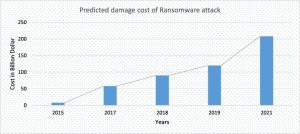What is Ransomware? Is it Still a Threat?
Ransomware is one of the biggest cybersecurity problems that organisations face today. It is a form of malware (malicious software) that can infiltrate single documents or entire networks. Occasionally we hear horror stories in the news of how one single ransomware attack can cost a business millions.
In one particular case in 2019, Norsk Hydro were victims to a devastating ransomware attack that infected 22,000 computers in 170 different sites worldwide. Reportedly, their entire workforce of 35,000 employees had to resort to using pen and paper until the company were forced to pay £45 million to get back on their feet. In the age of the modern workplace where we rely so heavily on cloud-based applications, internet access and multiple devices – the idea of using pen and paper across an entire workforce is enough to send dread into any boardroom.
Take a look at the other common types of cyber-attacks you should look out for.
How does it work?

It can be hard to imagine a form of cyber-attack that can cause so much widespread damage. So how does ransomware achieve what it does? Well, behind it all are cyber criminals who are becoming increasingly more sophisticated in their approach to hacking. Cybercriminals hack into networks, databases, devices, emails or pretty much any weak spot that any particular organisation might have. They then take hostage crucial data by encrypting files of all sizes and hold this data ransom until they are paid a large sum of money. Ransomware attacks leave victims with little choice but to pay the hacker to retrieve their data.
Is it Still a Threat?
Sadly, yes. Ransomware is a threat that every organisation faces today. With the rise in cybercrime since COVID-19, it’s all the more important to be aware of the risk of ransomware. Every business could be a potential target for hackers. Cybercriminals know that no matter what data they take, or what industry the company is part of, no organisation can risk data loss or downtime.
It doesn’t matter if you are a small company in Ireland, or a corporate giant in the USA – ransomware is still a threat to you.

What are the solutions?
Thankfully you don’t have to be a sitting duck just waiting to be attacked – there are ways to protect your data from ransomware attacks.
Secure the end-user
Your first line of defence against cyber-attacks are your end-users. Human error, even a simple accident, are the leading reason why organisations experience a data breach. The best ways to ensure that your data is safe, is to fully equip and educate your team to be aware of what to look out for.
Find a truster partner
It’s important to know that someone has got your back. Outsourcing your cybersecurity solutions to a third-party provider will help you to rest assured know that someone is working hard 24/7 to keep your data as safe as possible.
Backup your data
When your data is at risk, it’s essential to ensure that it is properly backed up. Keep these backed up files in off-site storage or a secure cloud network. Fully backing up your important data now will serve as a safety net to ensure your data won’t ever be lost forever – just in case your organisation ever faces a crisis.
These are just some of the ways that you can start protecting your data today. Ransomware is a costly, dangerous form of cyberattack that ruthlessly targets organisations all over the world.
Don’t be a ransomware victim.
Talk to Landmark cybersecurity experts to find out what your business needs to combat potential ransomware threats.









